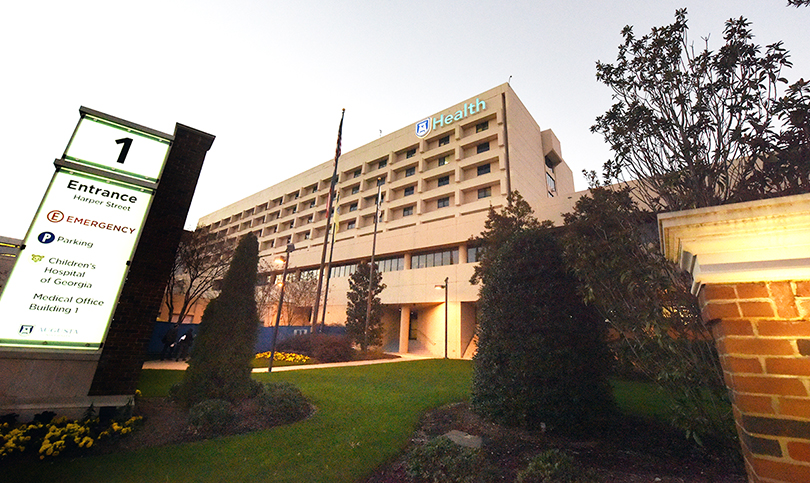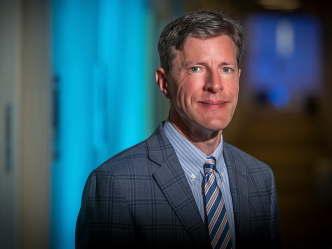Medical College of Georgia faculty consistently recognized among top 1 percent in nation for patient care, education, research
EDITOR’S NOTE: Today is National Doctors’ Day. The first Doctors’ Day observance was March 30, 1933, in Winder, Ga. The date is tied to the anniversary of the first use of general anesthetic in surgery (March 30, 1842) when Dr. Crawford W. Long used ether to remove a patient’s tumor. The first National Doctors’ Day was celebrated on March 30, 1991.
From developing some of the first oral contraceptives to pioneering telemedicine technologies for faster stroke intervention, doctors at Augusta University and its historic Medical College of Georgia have long been recognized as leaders in discovery, innovation, and patient care.
For 16 consecutive years, AU Medical Center has been the only local hospital to have its physicians ranked among the top 1 percent in the nation and included in the prestigious list of America’s Top Doctors®.
One of several national patient reference guides published by Castle Connolly Medical Ltd., the America’s Top Doctors online database and companion book designates physicians who are regarded by their peers and other health care leaders as among the very best in their field for specific diseases and medical techniques. Doctors do not and cannot pay to be included in any Castle Connolly guide or online directory.
This year’s honorees in alphabetical order are:
Dr. Cargill H. Alleyne Jr., Neurosurgery: Alleyne specializes in skull-based surgery and in treating blood vessel diseases of the brain and spinal cord, including strokes, aneurysms, and arteriovenous malformations at Georgia’s first Joint Commission-designated Advanced Comprehensive Stroke Center. He investigates novel treatments for cerebral vasospasm, strokes, and aneurysms. He is the Marshall Allen Distinguished Chair and chairman of the MCG Department of Neurosurgery and director of the Neurosurgery Residency Training Program at MCG and AU Health, Alleyne recently published his third book in a series of children’s books he is writing to spark kids’ interest in the fields of science and medicine.
Dr. Sharad A. Ghamande, Gynecology/Oncology: Ghamande is professor and chief of the Section of Gynecologic Oncology at MCG and associate director for clinical research at the Georgia Cancer Center at Augusta University. His clinical and research interests include robotic surgery for gynecologic cancers, chemotherapy trials in recurrent ovarian cancer and studies to prevent cervical cancer recurrence. Ghamande has worked with the National Cancer Institute-funded Georgia Gynecologic Oncology Group studying innovative ways to prevent and treat pelvic malignancies, and he is, a principal investigator on the NCI minority Community Oncology Research Program.
Dr. David C. Hess, Neurology: Hess is a neurologist and stroke specialist who co-founded REACH Health, Inc., a telemedicine program that has revolutionized stroke care by providing more timely intervention to patients in rural health care settings. Based in Georgia, the REACH telestroke system is now being used in many academic medical centers and integrated delivery networks across the nation. Hess is Presidential Distinguished Chair and chairman of MCG’s Department of Neurology, and he conducts research on novel treatments for acute ischemic stroke, including cell and restorative therapies. Hess is also interim dean of MCG, the state’s only public medical school, and Interim Executive Vice President for Medical Affairs and Integration, Augusta University
Dr. Walter J. Moore, Rheumatology: Moore cares for patients with inflammatory soft-tissue and connective-tissue disorders. He is also a leader in Patient- and Family-Centered Care, a philosophy of patient care pioneered at Augusta University’s health system that more fully engages patients and their families in health care decision-making. Moore is a professor of Medicine and Pediatrics in the Section of Rheumatology and Adult Allergy at MCG, where he also serves as senior associate dean for Graduate Medical Education and Veterans Affairs.
Dr. Julian J. Nussbaum, Ophthalmology and Vitreoretinal Disorders: Nussbaum specializes in treating patients with diabetic eye disease, age-related macular degeneration, and other degenerative and vascular disorders of the retina. He is professor and chairman of the MCG Department of Ophthalmology and co-director of the university’s James and Jean Culver Vision Discovery Institute, where basic and clinician scientists are investigating the diseases that cause blindness and other eye disorders. His own research interests include diabetic retinopathy and macular degeneration. Nussbaum also serves as associate dean for Ambulatory Practice at MCG, CEO for AU Medical Associates and executive vice president for Clinical Affairs at AU Health
Dr. Gregory N. Postma, Otolaryngology: Postma is director of Augusta University’s Center for Voice, Airway and Swallowing Disorders, where he provides proven treatments and therapies for patients with these disorders, including professional and singing voice care, gastroesophageal reflux, and chronic cough. Postma also performs airway surgery and reconstruction and helped pioneer in-office surgery. His research interests include extraesophageal reflux and surgical and non-surgical management of swallowing disorders. Postma is a professor and vice chairman of MCG’s Department of Otolaryngology – Head and Neck Surgery.
Dr. Satish S. C. Rao, Gastroenterology (GI issues): Rao helped establish Augusta University’s first Digestive Health Center. The professor of Gastroenterology and Hepatology at MCG pioneered biofeedback therapy for dyssynergic defecation and has developed several techniques for evaluating esophageal, gastric, colonic, and anorectal function – particularly the brain-gut connection – in patients experiencing digestive health difficulties. His research includes the pathophysiology and treatment of irritable bowel syndrome, constipation, fecal incontinence and visceral pain, particularly esophageal chest pain.
Dr. Kapil D. Sethi, Neurology: Sethi is professor of neurology and an expert in movement disorders. . His clinical interests include Parkinson Disease and botulinum toxin injections for dystonia and spasticity. His research interests include identifying better therapies, including new medications, for Parkinson’s, dystonia, and other movement disorders, as well as identifying risk factors and methods to slow the progression of these disorders.
Dr. Sandra G. B. Sexson,* Child and Adolescent Psychiatry: Sexson helps children and adolescents living with chronic diseases such as diabetes, cystic fibrosis and cancer to cope with the social and psychological challenges that often accompany these illnesses. Her research interests include pediatric oncology, ADHD, and school continuity for ill children. Sexson is professor and chief of the Section of Child, Adolescent, and Family Psychiatry in the MCG Department of Psychiatry and Health Behavior. She is also a national leader in psychiatric education.
Dr. Robert A. Sorrentino, Cardiac Electrophysiology: Sorrentino established the hospital’s first electrophysiology and arrhythmia services program for patients with irregular heartbeats or abnormal heart rhythms and heart failure. The director of what is now called the Heart Rhythm Center also evaluates and treats patients for fainting, or syncope, and assesses their risks for cardiac arrest. He has particular expertise in the implantation and management of pacemakers, defibrillators, and biventricular ICDs. He is also one of a limited number of physicians with proficiency in laser-assisted extraction of pacemaker and defibrillator wires. Sorrentino is the Creel Professor of Medicine in the Section of Cardiology at MCG, where he is also director of the Electrophysiology Fellowship Program.
Dr. David J. Terris, Thyroid and Parathyroid Surgery: The surgical director of the Thyroid/Parathyroid Center, Terris treats all disorders of the thyroid and parathyroid including hyperparathyroidism (primary and renal), goiters, cancer of the thyroid/parathyroid, Graves’ disease and hyperthyroidism. He performs robotic and minimally invasive thyroid and parathyroid surgery and pioneered a robotic facelift thyroidectomy, a minimally invasive neck surgery technique that eliminates a visible scar. Terris has published five books on endocrine surgery topics, and serves as a Regents Professor in the MCG Department of Otolaryngology – Head and Neck Surgery.
Dr. Martha K. Terris, Urology: Terris is professor and chief of the Section of Urology, holding the Witherington Distinguished Chair in Urology. She performs open, laparoscopic and robotic surgery to treat kidney, bladder and prostate cancer. She also performs prostate seed implantation, nerve-sparing prostatectomy and radical cystectomy with neobladder – creating a new bladder from the intestinal tissue. She also serves on the urology faculty at the Charlie Norwood Veterans Affairs Medical Center.
Dr. Jack C. Yu,* Pediatric Plastic Surgery: Yu is the Milford B. Hatcher Professor of Surgery and chief of Pediatric Plastic Surgery at MCG. He established and serves as director of the Craniofacial Center at Children’s Hospital of Georgia, where children receive treatment for cleft palate, premature suture fusions and other facial irregularities. He performs cleft lip, cleft palate, and craniosynostosis corrections, as well as aesthetic surgeries such as facelift, blepharoplasty, lip augmentation and rhinoplasty. He is the editor of the Cleft Palate-Craniofacial Journal, and his research focuses on stem cell therapy in ischemia-reperfusion and the anti-inflammatory effects of whole body vibration therapy. Yu is also the Milford B. Hatcher Professor of Surgery at MCG.
Three of these physicians – Drs. Sharad Ghamande, David Terris, and Martha Terris – were also named to America’s Top Doctors for Cancer® ranking in the top 1 percent of oncology doctors in the nation. The America’s Top Doctors reference books are available at castleconnolly.com and Amazon.com.
Published annually by Castle Connolly Medical Ltd., the America’s Top Doctors guides are based on nominations from tens of thousands of doctors and healthcare executives across the country. A physician-led research team then reviews the credentials of each nominated doctor before the Castle Connolly selection team makes the final choices. The most important criterion for physician selection is excellence in patient care. Other criteria include experience, education, board-certification, fellowships, hospital affiliation, medical school faculty appointments, honors and awards, and professional reputation.
*Denotes Children’s Hospital of Georgia physicians
 Augusta University
Augusta University




